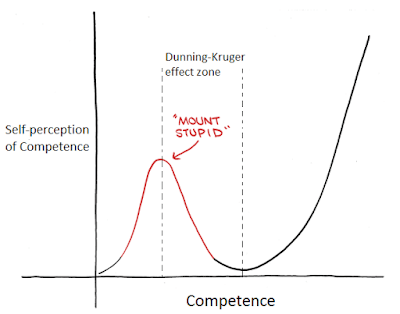邓宁-克鲁格效应(解释)

Table of contents
你决定学习一门技能,比如编程,于是买了一本你知道的最好的相关书籍。 读完这本书并做了一些练习后,你觉得自己已经掌握了编程。
假设你的编程能力从 0 级提升到了 3 级。 你觉得自己是个专家,于是在简历的 "高级技能 "部分添加了 "编程"。 你甚至把自己列为世界上最好的程序员之一。
事实上,你只是 "邓宁-克鲁格效应 "的受害者。"邓宁-克鲁格效应 "是人类思维容易产生的众多偏差之一。 这种效应以研究人员大卫-邓宁和贾斯汀-克鲁格的名字命名,它指出:
能力越差的人越会高估自己的能力,相反,能力越强的人越倾向于低估自己的能力。
研究人员根据逻辑和语法等一系列标准对学生进行测试,然后将实际测试结果与每个学生自己估计的成绩进行比较。
实际成绩最低的学生严重高估了自己的成绩,而成绩最好的学生则略微低估了自己的成绩。
有趣的是,这项研究的灵感来自于一个愚蠢的银行抢劫犯,他用柠檬汁涂满自己的脸,以为这样就不会被抓到,因为柠檬汁可以让东西隐形。 他想,如果柠檬汁被用作 "隐形墨水",那么也许也可以让他隐形。

进行上述研究的研究人员认为,能力较差的人并不知道自己能力较差,因为他们的能力不足以知道自己能力较差。
换句话说,要想知道自己能力不够,就必须知道自己目前的技能水平远远低于自己能达到的水平。 但你无法知道这一点,因为你不知道自己究竟能达到什么水平。 所以,你认为自己目前的水平就是自己能达到的最高水平。
如果这些听起来令人困惑,那就回到 "编程 "的例子:当你达到第 3 级时,你认为自己是编程高手,但在某个地方,有一个程序员已经达到了第 10 级,他正在嘲笑你的骄傲。
当然,你不知道自己在第 3 级时的无能,因为你不知道还有更高级别的存在,因此你以为你目前的级别就是最高级别。
比如说,你在书店里发现了一本新的编程书籍。
See_also: 人际关系中最后通牒背后的心理学此时,你可能会有两种选择,一种是放弃 "可能还有更多知识 "的想法,另一种是立即投入本书的学习,提高自己在编程领域的技能水平。
邓宁-克鲁格效应--一场自我游戏
最后一点正是天才与业余爱好者、智者与愚者、聪明与愚蠢的区别所在。
面对新信息,能力差的人往往不会从中吸取教训,能力依然较差;能力强的人意识到学习是没有止境的,因此会不断学习,提高自己的能力水平。
在特定情况下,他们在遇到新信息之前已经具备了一定的能力,这证明他们从一开始就抱着学习的态度,而当时他们的能力还不如现在。
为什么能力差的人不能从新信息中学习,变得更有能力?
要做到这一点,他们就必须放弃 "自己是专家 "的想法,而这会伤害自尊心。 继续自欺欺人地认为自己是最棒的,比正视自己无知的现实要容易得多。
事实上,邓宁-克鲁格效应就是虚幻优越感偏见的一种具体表现--人们倾向于高估自己与他人相比的优点,同时低估自己的缺点。
See_also: 8 个兄弟姐妹关系不当的迹象懒惰可能是另一个因素。 学习是艰苦的,大多数人宁愿不付出必要的努力来提高自己的能力水平。 这样,他们不仅逃避了艰苦的工作,同时还不断自欺欺人地认为自己能力很强。
参考资料
- Kruger, J., & Dunning, D. (1999).不熟练却不自知:认识自身无能的困难是如何导致自我评估膨胀的。 人格与社会心理学杂志 , 77 (6), 1121.
- Ehrlinger, J.、Johnson, K.、Banner, M.、Dunning, D.、& Kruger, J. (2008)。 为什么不熟练者不自知:对不称职者(缺乏)自我洞察力的进一步探索。 组织行为和人类决策过程 , 105 (1), 98-121.

